|
|
|
Sort Order |
|
|
|
Items / Page
|
|
|
|
|
|
|
| Srl | Item |
| 1 |
ID:
103414
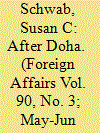

|
|
|
| 2 |
ID:
089033


|
|
|
|
|
| Publication |
2009.
|
| Summary/Abstract |
Negotiations among members of international institutions often stalemate yet the outcomes vary. Sometimes talks end in impasse and other times in agreement. Several familiar theories are unable to explain the contrast between two prominent outcomes in the World Trade Organization-its 1999 deadlock in Seattle and its 2001 agreement in Doha, Qatar, on an agenda for a new round. Extensive original evidence from these cases documents mechanisms that can tip the negotiation process between impasse and agreement in any institution, not only economic ones. The study illustrates benefits for international relations research of building on the relatively neglected tradition of negotiation analysis, a substantial part of which is outside political science.
|
|
|
|
|
|
|
|
|
|
|
|
|
|
|
|
| 3 |
ID:
190344
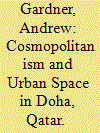

|
|
|
|
|
| Summary/Abstract |
This essay commences with an ethnographic sojourn through the Industrial Area, a peripheral zone of the urban landscape in Doha, Qatar that is densely inhabited by low wage migrant laborers. In this segregated urban enclave, I ascertain the openness to alterity and the interactions with difference that connect their experiences to the conceptual legacy of cosmopolitanism. Via a discussion of the segregated experiences of transnational migrants in Doha’s urban landscape, I then stake out a speculative argument for the connection between that segregation and the resulting cosmopolitan conditions. Together, these two assertions explore manifestations of cosmopolitan urbanism in non-Western and non-democratic cities. In the conclusion to this essay, I suggest that we might usefully disentangle our assessment of these cosmopolitan conditions from our sustained critiques of the global landscape of inequality, and turn my attention briefly to the western ethnocentricities that suffuse the analytic lens by which we gauge cosmopolitanism and the city.
|
|
|
|
|
|
|
|
|
|
|
|
|
|
|
|
| 4 |
ID:
103837
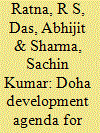

|
|
|
|
|
| Publication |
New Delhi, Centre for WTO studies, 2011.
|
| Description |
43p.
|
| Series |
Discussion paper no. 8
|
|
|
|
|
|
|
|
|
|
|
|
Copies: C:1/I:0,R:0,Q:0
Circulation
| Accession# | Call# | Current Location | Status | Policy | Location |
| 055895 | 382.92/RAT 055895 | Main | On Shelf | General | |
|
|
|
|
| 5 |
ID:
151740
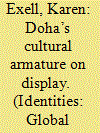

|
|
|
|
|
| Summary/Abstract |
After a brief discussion of the rapidly changing international museum world in Doha, this response piece engages with Peggy Levitt’s arguments around cultural armature and the role of museums in managing a city’s diversity, focusing on Doha, Qatar. Given the dominant migrant foreign population (88 per cent) and the careful protection of national citizenship in Qatar, the role of museums in managing diversity presents a situation that contrasts with older nation states: rather than encouraging inclusion, the museums in Qatar and the Arabian Peninsula states play a role in constructing and protecting a pure concept of national identity on behalf of a minority citizen population that deliberately fails to embrace any notion of diversity. This piece uses brief case studies to illustrate this process of exclusion, expanding Levitt’s original argument.
|
|
|
|
|
|
|
|
|
|
|
|
|
|
|
|
| 6 |
ID:
146457


|
|
|
|
|
| Summary/Abstract |
This concluding article argues that while the actions of emerging powers have left an indelible mark on the way multilateral trade is governed, they have not been able to disrupt to any significant degree the deeper structures of power that underpin the World Trade Organization (WTO). While emerging powers have proven to be important players in the Doha negotiations, particularly in the closing stages, they have ultimately come up against a glass ceiling that prevents their further rise. This ceiling is the product of a series of institutional factors that combine to facilitate alterations in the general arrangement of members one-to-another but which prevent deeper configurations of power from being disturbed. The result is that while we may have witnessed some changes in the multilateral trading system, these have been more akin to a rearrangement of the multilateral furniture than to a fundamental transformation of the system.
|
|
|
|
|
|
|
|
|
|
|
|
|
|
|
|
| 7 |
ID:
088248


|
|
|
|
|
| Publication |
2009.
|
| Summary/Abstract |
Farm support in higher income countries is a testament to the fundamental social and economic importance of agriculture, yet domestic efforts to support this sector can arouse multilateral discord in a world of global food markets. In this paper, we argue that the advent of biofuels offers a new opportunity for agriculture to contribute to society, and to do so in a way that reduces trade rivalry and improves energy security. Holding current agricultural production constant, we find that the EU has the potential to reduce oil imports between 6% and 28% by converting eligible agricultural crops into biofuels under two differing conversion scenarios. Further, 33% of food support could be removed with no net farm revenue loss, using the biofuel premia (compared with food value) of corn and rapeseed to compensate for subsidy reductions. These results can help overcome the current impasse in global trade negotiations by reconciling the needs of EU farmers with those who would gain from more liberal international trade.
|
|
|
|
|
|
|
|
|
|
|
|
|
|
|
|
| 8 |
ID:
078487


|
|
|
|
|
| Publication |
2007.
|
| Summary/Abstract |
What will be the legacy that President George W. Bush bequeaths to his successor in the fields of global trade and finance? In answering this question, the article will analyse the three most crucial international economic issues that the Bush administration has faced during its two terms in office. First, Bush's policy of trade liberalization will be considered. While the United States has negotiated a significant number of new bilateral and regional trade agreements over the past 7 years, global trade talks remain deadlocked. With increasing protectionist sentiment in evidence in Congress, Bush is unlikely to conclude the Doha Development Round by the time he leaves office in 2009. Second, global trade imbalances partly caused by the US current account deficit threaten the stability of international financial markets and global prosperity. The article concludes that the US has pursued a policy of 'begin neglect' towards the problem and needs to act more proactively to prevent a hard landing for the American and world economies. Finally, the economic relationship between the US and China is examined. The article argues that the United States needs to continue to engage China in the interests of global economic growth and regional stability in Southeast Asia while avoiding a trade conflict
|
|
|
|
|
|
|
|
|
|
|
|
|
|
|
|
| 9 |
ID:
108041


|
|
|
|
|
| Publication |
2011.
|
| Summary/Abstract |
Having recognised that the completion of the Doha Round of multilateral trade negotiations during 2011 is unfeasible, governments and the WTO Director-General are exploring whether a 'downpayment' on the Round could be negotiated before the December 2011 WTO Ministerial Conference. The initial indications are not promising. Worse, as argued here, a downpayment coupled with a retroactive revocation clause are unlikely on their own to change the politics of trade policy in the major trading nations. This makes the signing of the final deal no easier unless something alters the calculus of senior government leaders and establishes a credible end game for the negotiation.
|
|
|
|
|
|
|
|
|
|
|
|
|
|
|
|
| 10 |
ID:
092623


|
|
|
|
|
| Publication |
2009.
|
| Summary/Abstract |
What led to the calamitous drop in Iran's oil revenues in January 1977? Politics, religion, culture, and economics have been identified as factors contributing to the collapse of Iran's monarchy in 1979. But until now scholars have been unable to access documents that could shed light on the inner workings of the relationship between senior US officials and the Shah of Iran, whom Henry Kissinger lauded as "that rarest of leaders, an unconditional ally, and one whose understanding of the world enhanced our own." The declassification of the papers of Brent Scowcroft, who worked in the Nixon and Ford Administrations, marks a significant milestone in our understanding of the origins of the Iranian Revolution. They reveal that in 1976 the US and Saudi Arabia colluded to force down oil prices, inadvertently triggering a financial crisis that destabilized Iran's economy and weakened the Shah's hold on power.
|
|
|
|
|
|
|
|
|
|
|
|
|
|
|
|
| 11 |
ID:
088140
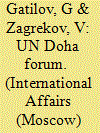

|
|
|
|
|
| Publication |
2009.
|
| Summary/Abstract |
THE GLOBAL FINANCIAL AND ECONOMIC CRISIS put a noticeable imprint on the preparations for the International Conference on Financing for Development, held at Doha, Qatar, from November 29 to December 2, 2008, and even made certain countries doubt the timeliness and expediency of that undertaking. But eventually a responsible approach prevailed, which made it possible to inscribe that high-level conference within the planned timeframe, with delegations from 169 UN and EC member-states (40 of them led by the heads of state and government) attending.
Thus, despite the intensification of the financial and economic crisis, the world community confirmed its resolve to work for the attainment of the Millennium Development Goals (MDG) set by the UN 2000 Summit. Yet another important step forward was made that secured the consistency of the course launched during the high-level events on assistance to Africa and on the MDG progress, which were held within the framework of the 63rd Session of the UN GA in New York on September 22 and 25, 2008.
The Doha Conference held a special place among those events. There is a growing awareness in the world that an effective solution to the development funding problems is crucial to success in all other vectors, be it the halving by 2015 of the numbers of people living in extreme poverty, reduction of child and maternal mortality levels, the fight against dangerous infectious diseases, including HIV/AIDS, malaria, and TB, or universal elementary education, access to drinking water, gender equality and sustainable ecological development parameters.
|
|
|
|
|
|
|
|
|
|
|
|
|
|
|
|
| 12 |
ID:
103026
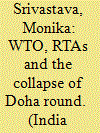

|
|
|
|
|
|
|
|